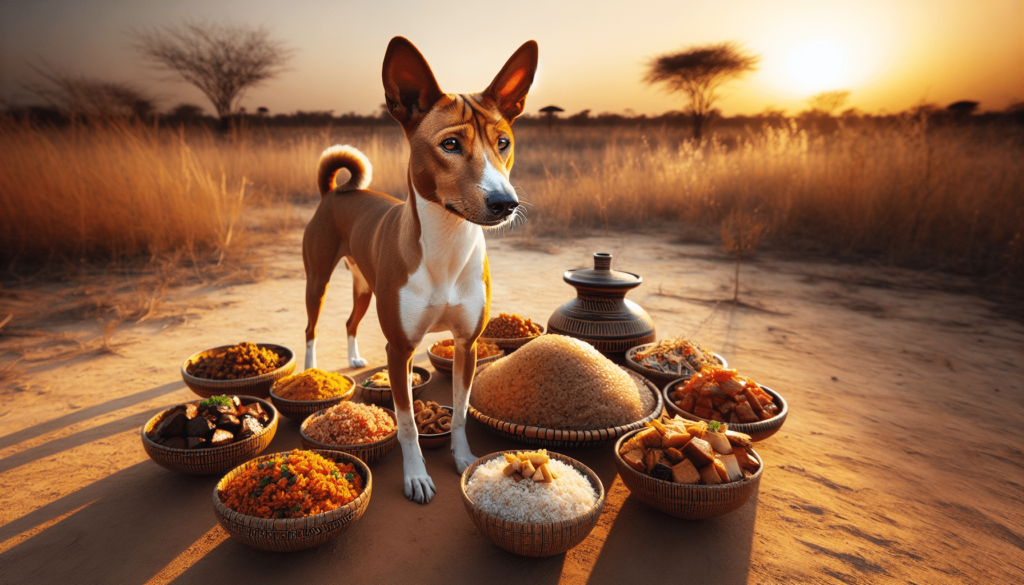Your cart is currently empty!
Best Foods For African Dog

Are you a proud owner of an African dog? If so, you’re in luck because we have compiled a list of the best foods for your furry companion. From nutrient-rich options to delectable treats, this article will provide you with expert advice on ensuring your African dog maintains a healthy and balanced diet. Discover the top picks and tips to keep your four-legged friend happy and wagging their tail in delight.
In this article, we will explore the best foods for African dogs, taking into consideration their specific dietary requirements. From protein-packed meals to essential vitamins and minerals, we will guide you through the options that will keep your canine friend thriving. Plus, we’ll throw in a few recommendations for tempting treats to reward good behavior or simply to show them some extra love. Stay tuned for the ultimate guide on how to nourish your African dog and keep them in tip-top shape for years to come.

1. Types of African Dogs
1.1 Basenji
The Basenji is a small to medium-sized African dog breed known for its unique characteristics. It is known as the “barkless dog” because it doesn’t bark like other dogs. Basenjis are intelligent, independent, and energetic dogs. They require a well-balanced diet to maintain their high energy levels.
1.2 Rhodesian Ridgeback
The Rhodesian Ridgeback is a large and muscular dog breed originating from Southern Africa. It is known for its distinctive ridge of hair along its back. Rhodesian Ridgebacks are loyal, protective, and playful. They have a strong prey drive and require a diet that provides them with ample energy and nutrients.
1.3 Boerboel
The Boerboel is a powerful and protective South African dog breed. It is known for its strength, loyalty, and bravery. Boerboels are excellent guard dogs and require a diet that supports their active lifestyle.
2. Nutritional Requirements of African Dogs
2.1 Protein
Protein is an essential nutrient for African dogs as it helps build and repair tissues, muscles, and organs. Good sources of protein for African dogs include lean meats, fish, poultry, and eggs. It is important to ensure that the protein is of high quality and easily digestible.
2.2 Fats and Oils
Fats and oils are a concentrated source of energy for African dogs and provide essential fatty acids that support their overall health. Good sources of fats and oils include fish oil, flaxseed oil, and chicken fat. It is crucial to provide the right balance of fats and oils in their diet to promote optimal health.
2.3 Carbohydrates
Carbohydrates provide African dogs with energy and fiber. Good sources of carbohydrates include whole grains such as brown rice and oats, as well as fruits and vegetables. It is important to choose carbohydrates that are easily digestible and provide a steady release of energy.
2.4 Vitamins and Minerals
African dogs require a balanced intake of vitamins and minerals to support their overall health and immune system. This includes vitamins such as vitamin A, vitamin E, and B vitamins, as well as minerals like calcium, phosphorus, and zinc. These essential nutrients can be provided through a well-rounded diet or through supplementation.
3. Best Foods for African Dogs
3.1 Commercial Dog Food
Commercial dog food brands specifically formulated for African dogs can provide a convenient and balanced option for their daily nutrition. Look for brands that use high-quality ingredients and have a good balance of protein, fats, carbohydrates, vitamins, and minerals. Reading the labels and choosing a brand that suits your dog’s specific needs is essential.
3.2 Raw Diet
Some African dog owners opt for a raw diet, which consists of feeding raw meat, bones, fruits, and vegetables. This diet mimics what dogs would eat in the wild and provides them with a natural and nutrient-rich diet. However, it is important to consult with a veterinarian and ensure that the raw diet is balanced and safe for your dog.
3.3 Homemade Dog Food
Homemade dog food allows you to have full control over the ingredients and quality of the food you feed your African dog. You can create balanced meals using lean meats, vegetables, and grains. However, it is essential to consult with a veterinary nutritionist to ensure that the homemade diet meets your dog’s nutritional needs.
4. Recommended Commercial Dog Food Brands
4.1 Acana
Acana is a trusted brand that offers a wide range of dog food formulas suitable for African dogs. Their formulas are made with high-quality ingredients and provide a balanced and nutritious diet for dogs of all life stages.
4.2 Orijen
Orijen is another top-quality dog food brand that offers a variety of formulas for African dogs. Their formulas are grain-free and contain a high percentage of protein, ensuring dogs get the necessary nutrients to thrive.
4.3 Merrick
Merrick is known for its premium quality dog food made with locally sourced ingredients. They offer a range of grain-free options and formulas for dogs with specific dietary needs, making it a good choice for African dogs with allergies or sensitivities.
4.4 Royal Canin
Royal Canin is a well-known brand that offers breed-specific formulas, including options for African dog breeds. Their formulas are developed with the specific needs of each breed in mind, ensuring that African dogs receive the right balance of nutrients.

5. Raw Diet for African Dogs
5.1 Benefits of Raw Diet
A raw diet can provide several benefits for African dogs, including improved digestion, shinier coat, healthier teeth and gums, and increased energy levels. Raw diets can also help with weight management and reduce the risk of certain health issues.
5.2 Raw Meat and Bones
When feeding a raw diet, it is important to include a variety of raw meats such as chicken, beef, and lamb. Bones are also a crucial part of a raw diet as they provide essential nutrients and help keep dogs’ teeth clean. However, it is important to choose bones that are safe for dogs to consume, such as raw meaty bones.
5.3 Fruits and Vegetables
Fruits and vegetables are essential components of a raw diet for African dogs. They provide vitamins, minerals, and antioxidants that support overall health. Some examples of fruits and vegetables that are safe for dogs include apples, carrots, spinach, and blueberries.
6. Homemade Dog Food Recipes for African Dogs
6.1 Chicken and Rice
Ingredients:
- Boneless chicken breast or thighs
- Brown rice
- Carrots
- Peas
- Chicken broth (low sodium)
Instructions:
- Cook the chicken thoroughly and shred it into small pieces.
- Cook the brown rice according to the package instructions.
- Chop the carrots and peas into small pieces.
- In a large pot, combine the cooked chicken, brown rice, carrots, peas, and chicken broth.
- Cook on low heat for 10-15 minutes until all the ingredients are well mixed and heated through.
- Allow the mixture to cool before serving it to your African dog.
6.2 Beef Stew with Vegetables
Ingredients:
- Lean beef stew meat
- Potatoes
- Sweet potatoes
- Green beans
- Beef broth (low sodium)
Instructions:
- Cook the beef stew meat until it is tender and can be easily shredded.
- Peel and chop the potatoes and sweet potatoes into small cubes.
- Cook the potatoes, sweet potatoes, and green beans until they are tender.
- In a large pot, combine the cooked beef, potatoes, sweet potatoes, green beans, and beef broth.
- Cook on low heat for 10-15 minutes until all the ingredients are well mixed and heated through.
- Allow the stew to cool before serving it to your African dog.
6.3 Fish and Sweet Potato Stew
Ingredients:
- White fish fillets (such as cod or tilapia)
- Sweet potatoes
- Green peas
- Fish broth (low sodium)
Instructions:
- Cook the white fish fillets until they are fully cooked and can be easily flaked.
- Peel and chop the sweet potatoes into small cubes.
- Cook the sweet potatoes and green peas until they are tender.
- In a large pot, combine the cooked fish, sweet potatoes, green peas, and fish broth.
- Cook on low heat for 10-15 minutes until all the ingredients are well mixed and heated through.
- Allow the stew to cool before serving it to your African dog.
7. Foods to Avoid
7.1 Chocolate
Chocolate is toxic to dogs and can cause symptoms such as vomiting, diarrhea, rapid breathing, and even seizures. Keep all chocolate products out of reach of your African dog.
7.2 Onions and Garlic
Onions and garlic contain compounds that can damage a dog’s red blood cells and lead to anemia. It is important to avoid feeding any foods containing onions or garlic to your African dog.
7.3 Grapes and Raisins
Grapes and raisins are highly toxic to dogs and can cause kidney failure. It is essential to keep all grapes and raisin products away from your African dog.
8. Feeding Schedule for African Dogs
8.1 Puppies
Puppies require more frequent feeding compared to adult dogs. It is recommended to feed them three to four times a day until they are around six months old. After six months, you can gradually transition them to a twice-a-day feeding schedule.
8.2 Adult Dogs
Adult African dogs can be fed twice a day, once in the morning and once in the evening. Ensure that there is a gap of at least 8-10 hours between meals to allow for proper digestion.
8.3 Senior Dogs
Senior African dogs may have different dietary needs and may require a more tailored feeding schedule. It is best to consult with your veterinarian to determine the appropriate feeding schedule and diet for your senior dog.
9. Importance of Hydration
9.1 Fresh Water Availability
Ensure that your African dog always has access to fresh and clean water. Dogs need to stay hydrated to maintain their overall health and proper body functions. Provide water in a clean bowl and change it regularly to ensure freshness.
9.2 Water Intake Monitoring
Monitor your African dog’s water intake to ensure they are drinking enough. Dogs may need more water during hot weather or after exerting themselves. If you notice a decrease in water intake or excessive thirst, it is important to consult a veterinarian to rule out any underlying health issues.
10. Conclusion
Feeding your African dog a balanced and nutritious diet is crucial for its overall health and well-being. Whether you choose commercial dog food, a raw diet, or homemade meals, it is important to meet their specific nutritional requirements. Consider their breed, age, and activity level when selecting the best foods for your African dog. Remember to avoid harmful foods and provide access to fresh water. By providing proper nutrition, you can ensure that your African dog leads a happy and healthy life.